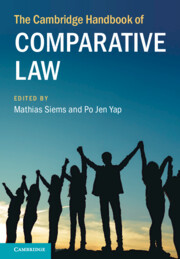Book contents
- The Cambridge Handbook of Comparative Law
- The Cambridge Handbook of Comparative Law
- Copyright page
- Contents
- Figures
- Tables
- Contributors
- Preface
- Abbreviations
- 1 Introduction
- Part I Methods of Comparative Law
- Part II Legal Families and Geographical Comparisons
- Part III Central Themes in Comparative Law
- 19 The Tradition of Comparative Law: Comparison and Its Colonial Legacies
- 20 Decolonial Theory and Comparative Law
- 21 Legal Transplants: A Theoretical Framework and a Case Study from Public Law
- 22 Legal Transplants: A Case Study of Private Law in Its Historical Context
- 23 Convergence and Divergence in Public Law
- 24 Convergence and Divergence in Company Law
- 25 Law and Development
- 26 Divided Legal Systems
- 27 Legal Pluralism and Commerce
- Part IV Comparative Law beyond the State
- Index
19 - The Tradition of Comparative Law: Comparison and Its Colonial Legacies
from Part III - Central Themes in Comparative Law
Published online by Cambridge University Press: 26 January 2024
- The Cambridge Handbook of Comparative Law
- The Cambridge Handbook of Comparative Law
- Copyright page
- Contents
- Figures
- Tables
- Contributors
- Preface
- Abbreviations
- 1 Introduction
- Part I Methods of Comparative Law
- Part II Legal Families and Geographical Comparisons
- Part III Central Themes in Comparative Law
- 19 The Tradition of Comparative Law: Comparison and Its Colonial Legacies
- 20 Decolonial Theory and Comparative Law
- 21 Legal Transplants: A Theoretical Framework and a Case Study from Public Law
- 22 Legal Transplants: A Case Study of Private Law in Its Historical Context
- 23 Convergence and Divergence in Public Law
- 24 Convergence and Divergence in Company Law
- 25 Law and Development
- 26 Divided Legal Systems
- 27 Legal Pluralism and Commerce
- Part IV Comparative Law beyond the State
- Index
Summary
Disciplines traditionally designated as ‘comparative’ – Comparative Literature, History, etc. – have radically called into question comparison as their apparent methodological foundation, even postulating its ‘obsolescence’. Such tendencies have also been informed and driven by the insight that the label ‘comparative’ is a legacy of the nineteenth century, when the ‘comparative method’ spread from biology and philology to other developing academic disciplines. This awareness of its roots in the peak period of colonialism and imperialism has opened ‘comparison’ itself to postcolonial critiques in these disciplines. ‘Comparison’ is no longer necessarily accepted as a timeless and ‘neutral’ methodological constant, but is rather viewed as a contextual historical phenomenon. By contrast, ‘Comparative Law’ scholars have been more hesitant to challenge that radically the role of comparison and the ‘innocence of method’ (Günter Frankenberg). This chapter explores the role that a lack of disciplinary historical self-awareness plays in this display of intellectual restraint. It interrogates, in particular, the traditional self-portrayal of Comparative Law as a ‘young’ discipline and the narrative of the famous 1900 Paris Congress as a mythical point of origin. The trope of such a ‘new beginning’ in or around 1900 insinuates a critical caesura that eclipses Comparative Law’s intellectual roots in the canon of nineteenth- century comparative disciplines, obscuring how these disciplines related to a colonial/imperialistic historical context. The chapter seeks to establish that the entanglement of our disciplinary history with that of the ‘comparative method’, that the coloniality of comparison itself is indeed an important subject in its own right. It suggests a context-sensitive recovery of the discipline’s institutional and discursive history, theoretically informed by scholarship specifically aimed at resisting ‘the mystifying amnesia of the colonial aftermath’ (Leela Gandhi).
- Type
- Chapter
- Information
- The Cambridge Handbook of Comparative Law , pp. 387 - 407Publisher: Cambridge University PressPrint publication year: 2024
- 1
- Cited by

